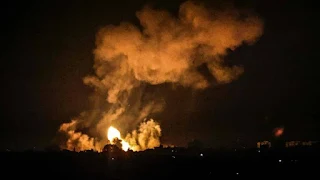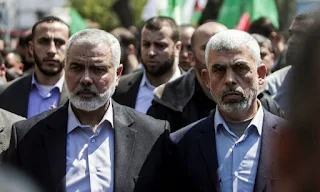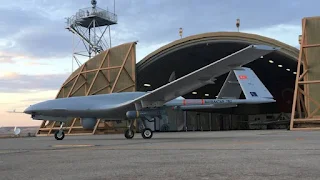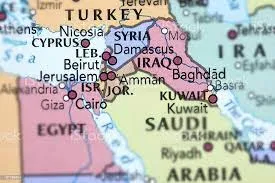Israeli raids on sites in the Gaza Strip
In response to the firing of two rockets from the Gaza Strip on Saturday morning, the Israeli army launched raids in the early hours of Sunday morning on sites in the Gaza Strip.
In the early hours of Sunday morning, the Israeli occupation army launched raids on sites in the Gaza Strip, which it said were in response to the firing of two rockets from the Strip on Saturday morning that fell in the sea off the greater Tel Aviv area.
Israeli warplanes launched about 10 raids on a site belonging to the Izz al-Din al-Qassam Brigades, the military wing of the Islamic Resistance Movement "Hamas".
Israeli warplanes launched 10 successive raids on a site called "Al-Qadisiyah", west of Khan Yunis, in the southern Gaza Strip.
Israeli artillery also bombed 4 observation points used by Hamas security forces to monitor the border strip with Israel in the northern Gaza Strip.
The Palestinian Ministry of Health did not announce any injuries as a result of the raids.
And the Israeli occupation army said in a statement: “A short while ago, warplanes and helicopters launched air strikes targeting a group of targets inside a Hamas rocket production complex in Khan Yunis, and tanks bombed Hamas military points on the border with the Gaza Strip.”
He added, "The size and quality of the targets is considered a response to the two rockets launched (Saturday morning) from the Gaza Strip towards the sea shores off the greater Tel Aviv area."
In a related context, the "Al-Aqsa" satellite channel of the Hamas movement said that the "resistance" targeted the Israeli helicopters with two SAM-7 missiles west of Gaza.
And earlier, the official Israeli channel, Kan, said that the army decided to carry out attacks on targets in Gaza in response to the firing of two rockets from the Strip and their landing in the sea off the shores of the center of the country.
The channel quoted an unnamed security source as saying that "the Israeli army decided to attack targets in Gaza in response to the rocket fire incident."
And on Saturday morning, the Israeli army said that two missiles were fired from Gaza and landed in the Mediterranean off the coast of the Gush Dan area in the center of the country, which includes the city of Tel Aviv.
"What happened is dangerous and unacceptable," the security source told Kan.
In the Gaza Strip, no party issued a comment on the event, nor did any party claim responsibility for firing any rockets.
Hebrew media: Israel is considering an attack on the Gaza Strip
Hebrew media said on Saturday that the Israeli occupation army command assessed the situation after two rockets were fired from the Gaza Strip that landed off the coast of Tel Aviv in central Israel, and is considering launching an attack on the Strip in response.
On Saturday, Israeli Chief of Staff Aviv Kohavi conducted an assessment of the situation after the firing of two rockets from the Gaza Strip that landed in the sea off Tel Aviv, during which they considered launching an attack on the Strip in response, according to Hebrew media.
And the Hebrew newspaper, Yedioth Ahronoth, said: "The Israeli army command assessed the situation today (Saturday) after two missiles were launched towards the sea, which landed near Gush Dan (an area in central Israel that includes Tel Aviv and Jaffa) and caused panic among a large number of residents who heard echoes Explosions".
"During the discussion, the officers discussed options to attack in response," she added, without further details.
According to the newspaper, in conjunction with the discussion of the assessment of the situation conducted by the Israeli occupation army, "contacts were made with the Egyptians who sent messages to Israel from Hamas, stating that firing the two rockets from the movement's launcher was a mistake."
And she continued, "Israel is reluctant to respond to the shooting and prefers not to be drawn into escalation, but on the other hand it does not want to continue with restraint or the local reaction as it was in the shooting incident on Wednesday."
And on Wednesday, three Palestinians were injured as a result of Israeli artillery shelling targeting Palestinian sites near the eastern and northern borders of the Gaza Strip, after an Israeli settler was wounded by gunfire from Palestinians in the northern Gaza Strip.
On Saturday morning, an Israeli army spokesman said that two rockets were fired from the Gaza Strip and landed in the Mediterranean Sea off the coast of the Gush Dan area.
"According to this policy, no warning was triggered and no objections were made (by the Iron Dome air defense system)," the spokesman added in a brief statement.
In turn, the Israeli police said in a statement on Saturday morning that it had received reports of hearing an explosion in the sea off the shores of Tel Aviv in the center of the country, but no damages or injuries were reported.
In the Gaza Strip, no party issued an immediate comment on these news, and no party claimed responsibility for firing any rockets.
Israeli settlements The occupation government turns “firing zones” into pastoral outposts
The National Bureau for Defending Land and Resisting Settlements issued a report in which it said that Israel, through its settler arms in the West Bank, has recently begun transforming areas declared by its army as “firing zones” into grazing outposts that seize large areas of land.
A Palestinian report said on Saturday that Israel, through its settlement arms in the West Bank, has recently begun transforming areas declared by its army "firing zones" into grazing outposts, seizing large areas of land.
This came in a weekly report that monitors settlements, issued by the National Office for the Defense of Land and Resisting Settlements of the Palestine Liberation Organization, a copy of which Anatolia obtained.
The report stated that "the Israeli government's settlement brigade has become the Civil Administration's agent (representing the government of Israel for the occupied territories) in converting firing areas into settlement farms."
The Settlement Brigade is an independent unit within the World Zionist Organization, funded by the Israeli government, and its mission is to be the executive tool of the Israeli government in establishing and consolidating rural settlements in the West Bank, the Negev and the Galilee.
According to the report, the brigade grants dozens of loans to build and develop illegal outposts, farms and vineyards throughout the West Bank.
The National Office indicated that the settlement brigade allocates lands to settlers as grazing areas in the firing zones without the approval of the commander of the central region in the Israeli army, as required by Israel.
He added, "The Central Command of the Israeli army stops the widespread fraud that is going on in smuggling lands designated for alleged military training to residents of settlement outposts and farms."
The report of the Palestinian office cited the Masafer Yatta area in the south of the West Bank, which has an area of about 30,000 dunams, and was declared by the Israeli army as a “firing zone 918” in the early eighties of the last century.
According to the report, in recent years, grazing areas in the West Bank have become a target for settlers from the outposts, and the so-called settlement farms, which are inhabited by a small number of settlers, but extend over a relatively large area.
He refers to data published by the Israeli human rights organization B'Tselem last November, according to which four farms seized an area of approximately 21,000 dunams in separate areas of the West Bank.
International law provides for the illegality of establishing settlements in the territories occupied since 1967.
The UN Security Council also issued its Resolution No. 2334, on December 23, 2016, which urges an end to Israeli settlements in the Palestinian territories, and calls on Tel Aviv to stop settlements in the West Bank, including East Jerusalem.
A former Israeli minister calls for the assassination of Haniyeh and Sinwar
A former Israeli minister called, on Saturday, to assassinate the leaders of the Palestinian “Hamas” movement, Ismail Haniyeh and Yahya Sinwar, following the fall of two rockets fired from the Gaza Strip into the sea in the “Gush Dan” area in central Israel.
According to the (private) Israeli channel 14, the former Minister of Transportation, Ayoub Al-Qar, said: “It is time to send Ismail Haniyeh and Yahya Al-Sinwar to meet (Abdulaziz) Rantisi and (Ahmed) Yassin, in reference to the two leaders who were assassinated by Israel in 2004.
Kara, who belongs to the Likud party (right), added: “If Israel does not respond to the two rockets fired from the Gaza Strip towards Gush Dan, this will be a fatal blow to the deterrence power of the State of Israel.”
"This will encourage Hamas and the organizations in Gaza to continue shooting at Israeli citizens," he added.
Earlier on Saturday, the Israeli army said that two rockets were fired from Gaza and landed in the Mediterranean off the coast of the Gush Dan region in the center of the country, which includes Tel Aviv.
On Saturday, the official Israeli channel, Kan, said that the army decided to carry out attacks on targets in Gaza in response to the firing of two rockets from the Strip and their landing in the sea off the shores of the center of the country.
In the Gaza Strip, no party has claimed responsibility for firing any rockets until 22:00 GMT.
On May 21, the Palestinian factions in Gaza and Israel reached a ceasefire agreement brokered by Egypt, after an 11-day military confrontation, during which Israel launched hundreds of air raids and artillery shelling, which caused the death and injury of hundreds of Palestinians.
The icon "Bayraktar" knows the map of international interest in the Turkish plane in 2021
After its brilliant success in managing the battles it fought in Libya, Syria and Qara Bagh, the "Bayraktar TB2" drone was able to gain the attention of a number of the world's armies and countries during the year 2021. It has become an icon of Turkey's advancing defense industries.
Since it entered the battles in Libya in 2019, and achieved impressive success in deterring Khalifa Haftar's forces, as well as carrying out other combat and reconnaissance missions, the Turkish "Bayraktar TB2" rallies have enjoyed great global admiration. This admiration will increase and the Turkish plane will once again prove its field superiority in the war to liberate the Karabakh region from the Armenian occupation in the summer of 2020.
All these successes made Bayraktar TB2 the icon of the Turkish defense industries for the year 2021, and the focus of wide attention for the armies of the world that raced to acquire this weapon. The strength of the Turkish march, compared to its other counterparts, lies in its technological superiority compared to its average price, which makes it more attractive in the global arms market. In addition, Turkey did not impose conditions on its arms exports and respected the sovereignty of importing countries.
Throughout the year 2021, many countries have either bought Bayraktar TB2, or have expressed interest in buying it.
Beginning in Africa
Bayraktar entered the brown continent in 2019, with the beginning of the aggression of Khalifa Haftar's forces against the Government of National Accord in Tripoli, where it carried out reconnaissance and combat operations that were crowned with great success. Global Market..
Morocco was among the most prominent countries that the "Bayraktar TB2" aroused its interest, and last April Rabat announced the acquisition of 13 of the Turkish marches for a sum of nearly $80 million, saying that "these planes will be distributed to all regions of the country," including the Sahara region. It also highlighted its intention to purchase the advanced version of it, "Bayraktar TB3," which Ankara is expected to start marketing by 2023. Last September, Morocco announced the receipt of the first shipment of the Turkish march.
After Morocco, the Ethiopian government submitted a request to the Turkish side to provide it, too, with "Bayraktar TB2" parades. At a time, the value of Turkish defense industry exports to Ethiopia amounted to $94.6 million between January and November, compared to about $235,000 during the same period the previous year.
In addition to these two countries, there were several reports of the Rwandan army's interest in supplying Turkish drones. Turkish President Recep Tayyip Erdogan's African tour also contributed to drawing the attention of the countries he visited to Turkish weapons, and to the consolidation of the defense partnership between Turkey and the continent.
Ukrainian concern, Russian concern
Ukraine received its first shipment of "Bayraktar TB2" in 2019, and since then this procession has played a pivotal role in its war against the Russian-backed Donbass separatists. Shortly afterwards, Ukraine announced in 2020 that it intends to purchase 48 unmanned aircraft of the same model, and celebrated them, saying that "it will give the Ukrainian army the ability to monitor and secure the Black Sea and the Sea of Azov, and the ability to strike surface and land naval targets of the enemy, using high-precision means."
The Ukrainian-Turkish cooperation in this context has even reached the development of the production line of "Bayraktar" parades on Ukrainian soil. On Saturday, December 25, Kiev announced the opening of a factory for the production of Bayraktar marches on its territory. Ukrainian Vice President Andrei Yarmac commented about the event, saying: "It all started with the supply of Bayraktar, and now its production has started in Ukraine."
The Turkish "Bayraktar TB2" drones have proven their efficiency in the eastern theater of operations, and the Ukrainian army announced last October that it had carried out successful strikes using the Turkish drone, with which the Russian "Howitzer D-30" gun was destroyed. This raised Russia's concern about the ability of these aircraft to overturn the rules of the military game in the region. And the Russian concern was revealed in the propaganda campaign it launched against "Bayraktar", and the American "Newsweek" website said that "Russia fears the Turkish Bayraktar drones more than it fears American weapons."
NATO countries accept it
And last May, during an official visit by Polish President Andrzej Duda to Ankara, Turkey signed an agreement to export 24 Bayraktar TB2 unmanned aerial vehicles to Poland, the latter becoming the first member country of NATO and the European Union. He arm his army with Turkish weapons. At the time, Polish Foreign Minister Zbigniew Rau said, "I am confident that these aircraft will increase the capacity of the Polish army and the eastern wing of NATO," as they are "technically advanced and have proven effective in battle."
In the same context, Latvia showed its interest in armed Turkish drones. Latvian Defense Minister Artis Pabriks visited Baykar's headquarters last June, and stated, "UAVs are the point that we are paying attention to right now, and we will continue to pay great attention to it," noting that "drones create many additional options for Latvia, and allow We really have to increase our fighting capabilities."
Britain, in turn, is still interested in the Turkish marches, and hinted at this in several previous references, most notably the British Defense Minister Ben Wallace’s praise of these planes, saying: “Take for example the Turkish drone “Bayraktar TB2”, its use in Syria, Libya and other places was responsible for the destruction of hundreds From armored vehicles to air defense systems. As confirmed by the Turkish Minister of Industry and Technology Mustafa Varank during his interview with CNN Turk, saying, "We gave them options and they are now seriously considering these options."
After the decline of Cairo, Beirut and Damascus Does Riyadh seek to become a cultural alternative?
After its name was often associated with oil, the desert, and the establishment of Islamic rites, it seems that the Kingdom of Saudi Arabia today seeks to turn into an important cultural center in the Middle East, through the festivals and events it hosted on its soil recently.
At a time when the capitals of Arab culture, such as Egypt, Iraq, Syria and Lebanon, are witnessing many crises, conflicts and collapses, the Kingdom of Saudi Arabia has seized the opportunity to penetrate the field from which it has always been excluded, to be able to transform into a competitive cultural power in the Middle East.
This remarkable trend, in which the Kingdom has begun to take serious steps during the recent period, is one of the most important precursors to the radical transformations promoted by Saudi Crown Prince Mohammed bin Salman, within the framework of his previously announced program, "Vision 2030", to diversify the non-oil resources in the Saudi economy. And building a new entertainment industry, and openness to the rest of the countries and peoples.
To ensure the success of this, Riyadh generously pumped huge funds to finance many new films, hosted film festivals, and provided opportunities to develop and train skilled artistic cadres.
However, experts and analysts believe that it may not be easy for Saudi Arabia to penetrate the cultural field in the Middle East, due to several challenges, the most important of which are political, religious and cultural sensitivities.
Saudi Arabia is a new cultural pole
After cinemas were banned for a long time, and artists and filmmakers were subjected to heavy surveillance and surveillance from the religious police, Saudi Arabia today hosts film festivals and major art concerts on its soil.
At the beginning of this month, about four years after the ban on cinemas was lifted, the first edition of the Red Sea International Film Festival was held in Jeddah , which welcomed on the red carpet the world's most important stars in art and acting.
During the festival, about 138 feature films and shorts from all over the world were shown, including 27 Saudi-made films.
In the midst of celebrating and praising Saudi efforts to organize a huge international festival of this scale and size, a Saudi official announced the Kingdom’s intention to support the production of more than 100 films by 2030, and to fund many other artistic and cultural projects.
Saudi Arabia was recently able, within the framework of its new orientation to embrace the global film industry, to attract three Hollywood films with large budgets to be filmed on its soil, and provided it with all possibilities to promote many regions within it, which for many years remained out of the limelight, and thus to become a competitive destination in the region. for the film industry.
In this context, Bahaa Abdul Majeed, an official in the Saudi Ministry of Investment, said, "The kingdom has one goal, which is to make Saudi Arabia a new center for filmmaking in the region."
From the Red Sea Film Festival in Jeddah, to the "Riyadh Season 2021", which was organized by the General Entertainment Authority last October, and its activities varied between musical performances, heritage, parties and entertainment shows, and was attended by artists and stars from different countries of the world. It drew attention as one of the largest festivals, and the Kingdom was counting on it to support the tourism sector and the entertainment industry, and to use the "soft arms" to open up to the rest of the world.
However, at the same time, it raised a lot of criticism, especially in Saudi, Arab and Islamic circles. Perhaps this is one of the most important challenges that the Kingdom has to face in order to become a cultural center in the Middle East, in light of the vacuum left by the rest of the Arab cultural beacons.
Arab and international challenges and criticisms
Activists and analysts believe that the new trend that Saudi Arabia is taking in the cultural field, in fact, hides behind it systematic and clever attempts to whitewash its crowded record of human rights violations, which has recently resonated widely with the international community and put it in a real predicament, under legal and human rights accountability.
Proceeding from these human rights concerns, film producers and filmmakers renewed their fears. Through their experience, they were often forced to reduce their artistic ambitions, by canceling the discussion of some topics, foremost of which are political issues, imposed by Gulf financiers.
On another level, activists objected to the strange and reprehensible appearances of them in a country that represents a Qibla for pilgrims and pilgrims, as they put it. They considered that the scenes reported by the media about the recent events, especially the "Riyadh Season" and the cinematic performances at the Jeddah Festival, which bypassed the prohibitions previously imposed in Saudi Arabia, are transformations that raise suspicion and apprehension towards bin Salman's new "reform" policies.
As for the technical, cultural and logistical levels, specialists considered that Saudi Arabia was decades behind the rest of its competitors in entering this field with all its weight, and therefore its transformation into a cultural pole may take a long time, despite the huge funds that it pumps, and was preceded by Qatar and the UAE, and did not It achieved what it was planning for a cultural sweep.
Film industry specialists wondered whether Arabs would really watch and accept Saudi films and productions, after Egyptian, Syrian, and other screens had been sweeping the screens for decades.








